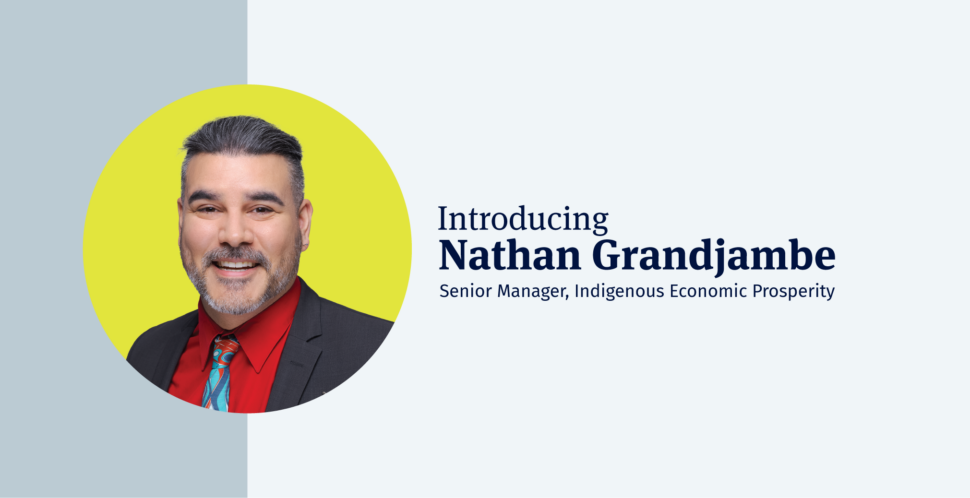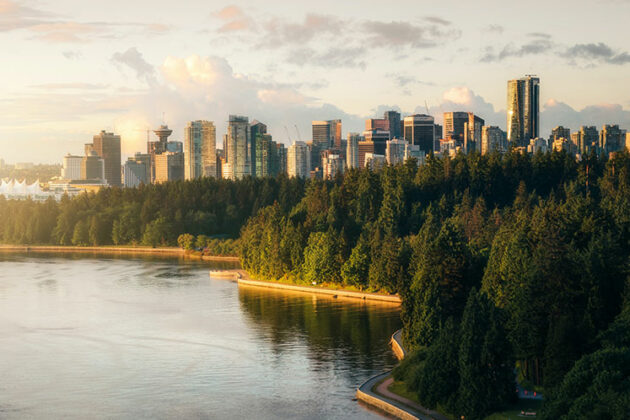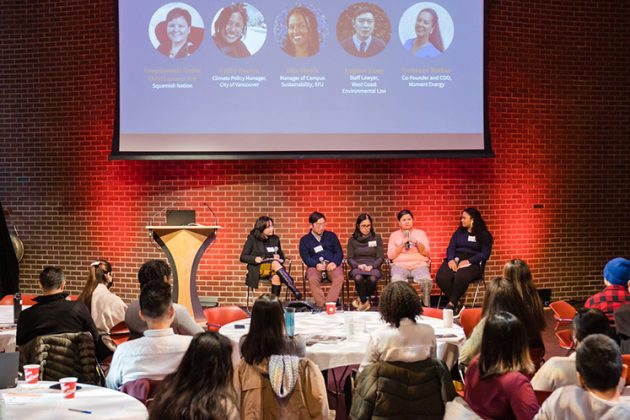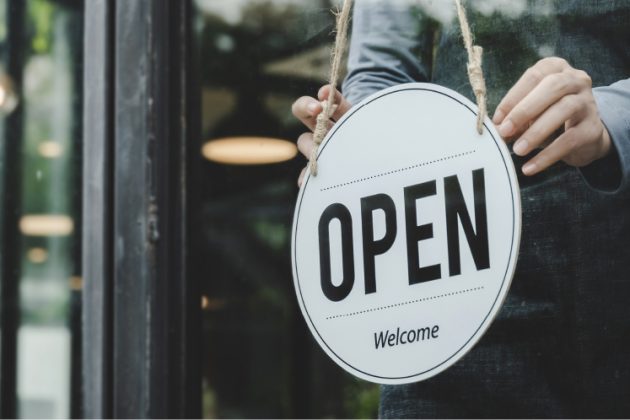As the economic development agency of the City of Vancouver, the Vancouver Economic Commission’s position is unique within the intricate web of relationships that form Vancouver’s economy.
We provide valuable perspective and insight to stakeholders and rightsholders on a wide range of matters pertaining to research, advocacy, policy, market intelligence, and more.
Despite the intersectional diversity of our team’s experiences and expertise, VEC is a settler-run agency, incorporated and functioning under colonial law and systems, and operating on the unceded and ancestral territories of the Squamish, Musqueam and Tsleil-Waututh Nations.
We recognize we have a long journey ahead to cultivate our knowledge, understanding and competency in forming collaborative, reciprocal relationships with the many Indigenous Peoples that participate in the Vancouver economy. We have a great deal to learn – and unlearn – when it comes to moving the dial on supporting the diverse Indigenous business community.
It is our intention to leverage our specific privileges, expertise, and perspective in Vancouver’s business and economic development ecosystem in service of our core pledge towards Indigenous Economic Prosperity.
Joining us today to provide some insight into the dimension and scale of the work ahead is Nathan Grandjambe, VEC’s first Senior Manager of Indigenous Economic Prosperity. Hello, Nathan!
tânisi, nathan grandjambe nisîyihkâson. Nêhiyâw niya, Mikisew Cree First Nation niya êkwa. kayahtê ostêsimâwoyasiwêwin ayinânew askiy nitohci. anohc ka-isi-wâpamitin mâna ka-wiyâsôyân ohci Musqueam, Squamish, Tsleil-Waututh êkwa askiyak, kahkiyaw kâ-isi-kîsikâk êkwa ohpâkiwinak.
I’ve just introduced myself as Nathan Grandjambe, Nêhiyâw and from Mikisew Cree First Nation. Originally, I come from Treaty 8 Lands. I’ve come here with gratitude to the territories of the Musqueam, Squamish and Tsleil-Waututh peoples. And I’m just so grateful for the opportunity to be here and am very grateful for the depths of relationships and stewardship which these Host Nations have taken care of the land since time immemorial.
Nathan, at this point, you’ve been with the Vancouver Economic Commission for about six months. What initially attracted you to this role?
The purpose of this full-time job is to truly focus on greater Indigenous Economic Prosperity, where the emphasis is on how we can be more inclusive, more supportive, reduce systemic barriers as well as enable greater Indigenous engagement within the economy.
This is still an all-too-new conversation, and from a position that takes the opposite stance of what we’ve seen in Canada throughout its entire history. It’s an incredible honour to be at a table where the central objective is to facilitate change that is both overdue and necessary.
I’m drawn to this work because of the uniqueness of the opportunity, and the potential of being able to facilitate change at scale both within Canada and in our international relations with Indigenous Peoples.
I’ve heard you say that what we bring to our work is unique because of what we bring as a person. Could you share a little about yourself, your lived experience, your career and background, and how they tie into your approach and work?
My lived experience of being an off-reserve Indigenous person taken from community may certainly have fostered a journey distinct from some of my contemporaries in my community. I have Nêhiyâw ancestry from my maternal side, going back four generations as Canadians; on my paternal side, I have Irish ancestry also going back four generations, back to when they first came to Canada.
Being off-res and of mixed ancestry, I’ve had come to terms with what being Nêhiyâw and Canadian means to me. Holding these two vastly different sources of cultural background is like being at the meeting of two rivers. Inherent in this confluence is such a diversity of perspectives – such as how we relate to our non-human relations.
So, I try to navigate my work and relationships with Two-Eyed Seeing, or perceiving with positive elements of both settler and Indigenous wisdom and knowledge. That juxtaposition is something I try to bring into my work: to carefully consider where and how to balance the application of these different values.
How does this connect to your interest in economic development?
My years in finance spanned working teller jobs and helping people pay their bills and navigate financial planning and investments, right through to wealth management. That could mean supporting clients with millions of dollars to create a charitable foundation or to help them pass wealth down to the next generation. Of course, aiding them all the time with building investment portfolios that are imbued with their values.
That chapter was about helping people navigate the dry world of finance in a meaningful way while ensuring that their financial relationships reflected what they cared about.
That’s also why economic development interests me: it’s a meeting place of intention and activity where values, community, past, future, and present can exist together.
It’s clear that your lived and career experience equips you to identify pathways to multigenerational prosperity! What opportunities does this role hold in shaping Vancouver’s future economy?
Vancouver’s future economy sits in an interesting place right now: the federal, provincial, and municipal governments have all committed to implementing the United Nations Declaration on the Rights of Indigenous Peoples (UNDRIP). The City of Vancouver has its own specific action plan for implementing UNDRIP, in full collaboration with Musqueam, Squamish & Tsleil-Waututh Nations.
Of note is that Vancouver’s action plan expands on the single economy-related call in UNDRIP, expanding it up to six clearly articulated calls; here at the VEC, we have a hand in bringing them to life effectively.
What would you say are some of the biggest economic implications when Vancouver implements UNDRIP?
The economic implications of Vancouver’s implementation of UNDRIP are manifold. It could unlock opportunities in tourism, entrepreneurial development, and ultimately integrating the local First Nations and Indigenous community into the very shape of Vancouver’s economy, and beyond.
How would you describe economic reconciliation and Indigenous economic prosperity, and how they relate to one another?
In economic reconciliation, we’re talking specifically about the economic redress of historical and contemporary injustices of the original and ongoing colonization of Indigenous Peoples. Indigenous Peoples have been systematically excluded from the economic table. Economic reconciliation is about finding pathways beyond equal opportunity while actively counterbalancing systemic and ongoing economic disenfranchisement.
As for how economic reconciliation relates to Indigenous economic prosperity, it may be easier, though by no means entirely accurate, to think about Indigenous economic prosperity as being farther along the continuum on which economic reconciliation also exists. Economic reconciliation can build toward Indigenous prosperity. It is a key driver writ large; a narrative undertaken between Indigenous Peoples and the rest of the Canadian population, but it is not a place to rest the way Indigenous economic prosperity could be.
Every time an Indigenous person finds the opportunity to do business in a way that is meaningful to them, that contributes to and reflects their identity, cultural background, expression, their social value, and can generate socioeconomic traction, that’s one pathway to Indigenous economic prosperity.
The aim is to build an economy where Indigenous people will be able to freely engage in economic opportunity and respond and rise to it in a way that is truly and wholly theirs, not just a reflection of the economic paradigm colonization has placed around them.
What are the things anyone can do to contribute towards Indigenous economic prosperity?
I would love people to realize that there are so many Indigenous businesses they could engage in when looking for experiences, services, and great products – and that one of the easiest ways to facilitate economic reconciliation is to vote with your dollars.
You can also vote with your feet by showing up to Indigenous events, to demonstrate that you support and are looking for meaningful change in this space. Heck, vote with your actual democratic rights and support political change that positively engages in economic development with and by Indigenous Peoples.
These would be the first, most immediate actions I’d like to see more of.
Shop First Nations and the Canadian Council of Aboriginal Businesses have great directories of Indigenous businesses or services that might be near your area. I highly recommend checking those out as great touchpoints and an introduction to the broad panoply of Indigenous businesses and economic opportunities out there.
As for what we can do at VEC, we aim to create additional pathways to nurture economic reconciliation and make sure that there’s a greater awareness of these issues, as well as increase the opportunities for Indigenous businesses to not just survive but thrive within Vancouver.
I’ve heard you say that this long, sustained work.
We need to be committed to seeing these actions through more than just once: it needs to be more than tithing or token gestures. It needs commitment to changing not just the current legislative and economic systems impacting Indigenous Peoples, which could be reversed in the next electoral cycle, but to change the very fabric through which we weave all economic activities. At the crux of the issue is aligning our economic activities with our values.
To be fair to any one generation we must acknowledge the broader context in which these conversations are taking place. It’s hard to take meaningful action if we don’t fully know all the facts or the context – this is an intergenerational problem that has been fostered and implemented by generations of systemic oppression built around us.
It’s not on any of us to own all those things that happened, but it is on us to think about what kind of solutions we need to bring to the fore to prevent them from echoing just as loudly for the next generation. And those long-term, intergenerational solutions must begin now if we are to see the truest manifestation of economic reconciliation, and of being able to say that we are supporting Indigenous prosperity.
Any parting thoughts?
I call anyone who values these issues forward to join us in the conversation. Come out to pow-wows, come out to Indigenous markets, check out Indigenous businesses, and bring your friends and family.
Learn more and get involved:
- Discover Indigenous businesses: Shop First Nations
- Learn more about Indigenous businesses: Canadian Council of Aboriginal Businesses (and check out their Aboriginal Business Report)
- VEC’s take: What is economic reconciliation?
- 10 organizations committed to regenerating Indigenous prosperity through investment, education, and relationship building
- Looking for panelists, board members, inspiration? Here are 22 Indigenous knowledge-keepers and trailblazers to watch



